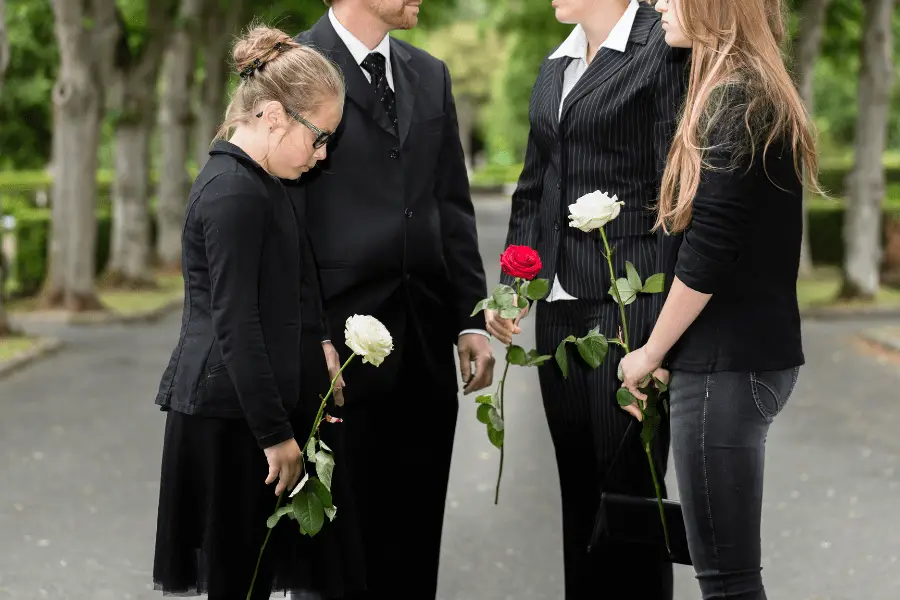When a friend or loved one passes and you have to decide whether to have an open casket, it can be a hard choice.
It can be even harder for you to have to decide if you have a child that will be attending the funeral if they should view the deceased in their casket.
There are certainly good arguments on either side, but what is REALLY the anwer?
Viewing an open casket should be a person’s choice, whatever their age. You should never force a child to view an open casket or even to go to the funeral. Take the time to explain the situation and to answer all questions the child has. Also, consider your own grief (Speak to a professional today from the comfort of your home) and needs during the funeral.
Every child will be different in their understanding of what is happening, this has a lot to do with maturity and not always as much to do with age.
By making sure that they are comfortable and understand the situation as best they can and knowing that they can back out at any time is critical.
If you are still in two minds about this, then please do continue reading.
I’ll explain how to decide whether your child is ready and how to prepare them.

Is the child even ready to go to the funeral?
Before you even think about having the child look at an open casket you have to think about if your child is even ready to go to the funeral.
There is no specific age when a child is ready to go to a funeral. It depends on the child but in general, children start to understand permanence around the age of 7.
Permanence is the concept that when someone or something is gone and will not return.
If you aren’t sure if your child is even the right age to deal with a funeral, please read my article here where I go into a lot more detail about it.
The best way to know whether a child should go is to ask them after you have explained what death is and how a funeral works.
I have written a more in-depth article about when a child would be ready to go to a funeral and how to prepare for it here.
Should my child view the open casket?
Now that we have figured out if the child is able to handle going to the funeral and if the answer is “Yes”, how do you know if they are ready to see the open casket?
It is going to be the same thing for the whole process and steps, you ask them. You want to ask the child if they want to see the body and make sure they do not feel pressured to do so.
Often people are afraid of what they may see when they peer into the casket. Except for very rare cases, the deceased should still look the same as they did while alive.
Explaining that the person they lost is now at peace, feels no pain and will not harm them are good ways to help a child cope with their fear.
For very young children, they may not even be aware of what is happening, and this is something that is easy to tell by talking to the child before the event.
If you personally have never seen a dead body, then it is a good idea to seek out someone who has and ask they some question about. The better prepared you are the better you can prepare your child.
How to prepare your child for the funeral and open casket
You should always prepare children for what might and will happen. This will relieve a lot of their anxieties and fears.
This is especially true when this is the first time that they have ever even been to or know someone that has dies.
The younger they are the simpler you want the language to be, you want to explain as much as possible in a way that they can understand.
When explaining the funeral to the child you do not want to lie or stretch the truth (a white lite).
Telling them things like “grandma is sleeping or going away on a trip” can be both confusing and potentially damaging to a child mental health.
If the child actually believes this they may become afraid of bedtime and vacations. Often it’s better to use a more common euphemism such as “to pass away” or “to cross over”.
Children understand a lot more than we give them credit for and can often digest even very upsetting information if told in the right way.
When you describe the funeral process do so step by step I have outlined some main talking points for you to talk to the child about.
- Why do we have funerals- This is the first thing you should do, most children have only seen funerals in cartoons and on the TV. So by explaining that funerals are an important family tradition. They are done for the friends and loved ones to say goodbye and start the grieving process.
- What they will see- Start from the child waking up that morning to the end of the day. They will see everyone usually dressed in dark colors and why.
- Where they will be going – This follows what they will see, as they may have never been to a church or funeral home before. These places can be intimidating and scary to the child.
- Who they will see- Often when a young child goes to a funeral, there will be many new faces and that the child has never seen or maybe just once before. These people often know who the child is so having them ready to greet all these people is important.
- How they will feel- Feelings are a hard thing to explain to a child, but they should know that there are no wrong ways to feel about a lost loved one. That they can cry, or be silent and it’s ok. You may need to give extra attention and affection to the child so they do not feel forgotten or neglected.
- How others may react- This relates to feeling as well that all people deal with death and grief differently so they will see many different emotions.
- How long it will be- Funerals can be very long, and if the child is going to go throughout the whole thing it will be a long day not only emotionally but also physically. So, having a place where they could rest could be a good idea.
- How they can and can’t act- You do want the child to express their emotions, you also want them to know that having an outburst or tantrum is not something they should do. If they are prone to this having a safe space for them to go is crucial.
- What they can do- It is helpful to make arrangements with a trusted adult so a child can leave the funeral or memorial service early if they wish. Having a pre-visit so they know where the bathrooms, water fountains and rest area are is also a good way to put them at ease.
- What they will see -if an open casket is planned, talk about how the deceased will look. Explain that they will look like they are sleeping because they are relaxed and in a peaceful place.
Children’s books to explain death
One way to explain what will happen at funerals and even the concept of passing on from this life is to use a children’s book.
There is normally a wide selection for different ages at your local bookstore.
Here are some suggestions you can find on Amazon.
The Endless Story: Explaining Life and Death to Children (Melissa Kircher)

Available on Amazon
Where Are You? A Child’s Book About Loss (Laura Olivieri)

Available on Amazon
Something Very Sad Happened: A Toddler’s Guide to Understanding Death (Bonnie Zucker)

Available on Amazon
Encourage participation in the funeral
If they do want to go let your child be a part of the funeral services as much as they feel comfortable.
They might want to just want to create a drawing for the memorial table, choose a song for service, place flowers on the casket/ grave or even touch the body.
If you need to order flowers for a funeral then I can really recommend BloomsToday.com as I had an excellent experience buying from their site. You can check out the deals they have here, but when I ordered it was 25% off! Fingers crossed!
If they are attending the funeral of a close family member or friend, they may even be able to give the deceased something to take with them, such as a drawing.
These are options that you want to discuss and let them know that they have and they can always back out if they don’t feel confutable
What if my child does not want to go to the funeral or see the open casket?
This is also fine as the child may just not be ready for this or for attending the whole service.
By being sure to arrange for adult supervision to look after your child during the service could be an option. They could be near everything but just not near the body. Another family member or close relative that is older and would not mind taking the child out of the service for a break or walk around is another option.
If there are other children hiring a babysitter for the day for the children is acceptable as well. If nothing else, it’ll give you a chance to grieve without having to worry about your child.
If your child doesn’t want to attend the funeral services or part of the funeral, see if you can figure out why this is. You may be able to uncover some fears or doubts which you can explain to them.
Children have wild imaginations and it may get the better of them at this time. If your child still adamantly refuses to go, don’t force it.
What are other options for the child not attending the funeral?
If they choose not to go help them find their own way of closure. If your child doesn’t attend the funeral or stays away from the whole thing, still help them to grieve and find closure.
There are options for a private viewing of the body and funeral homes. This is also a good way to bring them to the places and have a “walk through” before the actual service.
Many funeral homes are open to this and just contact the funeral director beforehand to set it up.
Making a trip after the funeral to the cemetery to place flowers on the grave is nice. You could also make memory lists about the good times you had with the deceased.
Ask them what they want to do, maybe it would be as simple as sharing a meal at a restaurant they used to frequent. Guiding the child with suggestions is great but let your child take the lead and follow.
Follow up with your child
If your child attends the funeral or even if they didn’t, you want to follow up and check in with them often as possible.
Let them talk about how they felt, how they are feeling, and try to answer any questions that they still have.
By opening up about how you feel as well will show them that it is ok to have emotions and grieve.




